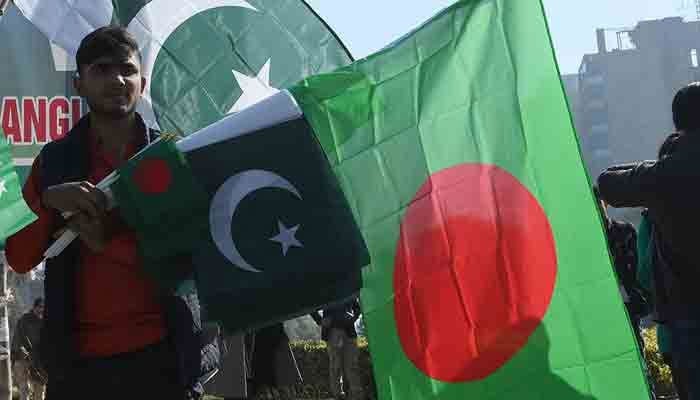Healing history
South Asian region has borne burden of protracted hostility, particularly between India and Pakistan, for over seven decades
Pakistan and Bangladesh held a foreign secretary-level Foreign Office Consultation (FOC) meeting in Dhaka on Thursday – the first such diplomatic engagement between the two countries in 15 years. The last FOC was held in 2010, where discussions covered contentious and unresolved issues such as Pakistan’s unconditional apology for the 1971 war crimes, compensation for war damages, repatriation of stranded Pakistanis, Bangladesh’s share of pre-1971 assets and the repayment of foreign aid following the 1970 cyclone. Unfortunately, little progress was made at the time. In this context, regional observers are viewing the recent resumption of dialogue as not just a positive sign, but a necessary and welcome development. For far too long has Pakistan lagged in strengthening its relationships with its neighbours. The South Asian region has borne the burden of protracted hostility, particularly between India and Pakistan, for over seven decades. Regional cooperation has often been held hostage to tensions between the two countries and this is a key reason why Saarc, despite its potential, has remained largely ineffective.
India’s role in the region has often been criticised for being overbearing. While Pakistan, as a nuclear power, has resisted coercion, India has tended to treat its smaller neighbours as if they were satellite states. Its relations with most neighbouring countries have been strained, especially under the Modi regime. New Delhi’s unwavering support for Sheikh Hasina in Bangladesh, despite growing domestic public resentment towards her authoritarian governance, alienated many within Bangladesh. Pakistan, on the other hand, took a more principled stance against Hasina’s politically vindictive policies. That said, it is also important to acknowledge that the frosty ties between Pakistan and Bangladesh are rooted in a painful and violent shared history. The legacy of 1971 – marked by bloodshed, betrayal and bitterness – has cast a long shadow over bilateral relations. Healing from such history is neither quick nor easy.
Even so, the resumption of diplomatic ties offers a hopeful sign. If we are to build something meaningful from this moment, we must proceed with care and clarity. Foreign Minister Ishaq Dar is expected to visit Bangladesh later this month – another encouraging step forward. Since the fall of the Awami League-led government on August 5 last year, relations between the two countries have shown a gradual improvement. Prime Minister Sheikh Hasina resigned in August 2024 and fled the country following weeks of violent protests that resulted in nearly 300 deaths. In the aftermath, a political reset seems to be underway – one that Pakistan must engage with constructively. There is now a real opportunity to collaborate on trade, education, culture and more. People-to-people contact is essential. Artists, academics, businesspersons, doctors and journalists should be able to travel freely between the two countries. We must recognise the trauma of our past – the fact that we were once one nation and that our policies and actions contributed to alienating the people of what became Bangladesh. But recognition alone is not enough. We must move forward with humility, openness and a desire to build trust. There are many examples in the world of countries with far more violent and traumatic histories that have managed to move towards reconciliation and cooperation. Pakistan and Bangladesh must do the same. If we can acknowledge our past mistakes, let go of hostility and work for the prosperity of our peoples, the entire region will benefit.
-
 BAFTAs 2026: Kerry Washington Makes Debut In Custom Prada Gown
BAFTAs 2026: Kerry Washington Makes Debut In Custom Prada Gown -
 Jennifer Lopez Gets Emotional As Twins Max And Emme Turn 18
Jennifer Lopez Gets Emotional As Twins Max And Emme Turn 18 -
 Andrew Mountbatten Windsor Blunders Are Result Of 'conspiracy Of Silence'
Andrew Mountbatten Windsor Blunders Are Result Of 'conspiracy Of Silence' -
 Keith Urban Fires Entire Management Team After Divorcing Nicole Kidman
Keith Urban Fires Entire Management Team After Divorcing Nicole Kidman -
 Kylie Jenner Marks Death Anniversary Of Hairstylist Jesus Guerrero With '222' Tribute
Kylie Jenner Marks Death Anniversary Of Hairstylist Jesus Guerrero With '222' Tribute -
 Daniel Radcliffe On How It's Like Seeing New Harry Potter Cast Years Later
Daniel Radcliffe On How It's Like Seeing New Harry Potter Cast Years Later -
 Andrew Portrait Makes Unexpected Debut At Louvre Museum Over Epstein Protest
Andrew Portrait Makes Unexpected Debut At Louvre Museum Over Epstein Protest -
 Italy: Skeleton Of Saint Francis Of Assisi’s Goes On Public Display For First Time After 800 Years
Italy: Skeleton Of Saint Francis Of Assisi’s Goes On Public Display For First Time After 800 Years -
 Hailey Bieber's Subtle Gesture For Eric Dane’s Family Revealed
Hailey Bieber's Subtle Gesture For Eric Dane’s Family Revealed -
 Moment Prince William 'broke Down' And 'apologised' To Kate Middleton
Moment Prince William 'broke Down' And 'apologised' To Kate Middleton -
 Paul Mescal And Gracie Abrams Stun Fans, Making Their Romance Public At 2026 BAFTA
Paul Mescal And Gracie Abrams Stun Fans, Making Their Romance Public At 2026 BAFTA -
 EU Rejects Any Rise In US Tariffs After Court Ruling, Says ‘a Deal Is A Deal’
EU Rejects Any Rise In US Tariffs After Court Ruling, Says ‘a Deal Is A Deal’ -
 King Charles Congratulates Team GB Over Winter Olympics Success
King Charles Congratulates Team GB Over Winter Olympics Success -
 Meryl Streep Comeback In 'Mamma Mia 3' On The Cards? Studio Head Shares Promising Update
Meryl Streep Comeback In 'Mamma Mia 3' On The Cards? Studio Head Shares Promising Update -
 Woman Allegedly Used ChatGPT To Plan Murders Of Two Men, Police Say
Woman Allegedly Used ChatGPT To Plan Murders Of Two Men, Police Say -
 James Van Der Beek's Widow Mourns Eric Dane Days After Husband's Death
James Van Der Beek's Widow Mourns Eric Dane Days After Husband's Death




